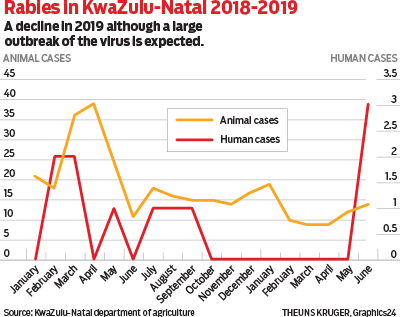HIGH ALERT FOR RABIES IN KZN
Source: News24 (Extract)
Posted: Aug 05, 2019
The KwaZulu-Natal Department of Agriculture is on high alert for human rabies in the province following the death of four people between May and June who died after failing to seek treatment for dog bites.
Last year, eight people died of rabies in KZN, with the total number of rabies in animals reaching 203.
According to the department, they anticipate a possible increase in both human rabies and rabid dogs in the near future.
The problem is twofold: people who have been bitten do not always seek preventative rabies treatment after being bitten by an animal, and animals are not being vaccinated.
“Human deaths are perfectly aligned with the disease in dogs, which are the main source of rabies,” said department spokesperson Mac Makhathini.
He said the prevalence of rabies in dogs is dependent on the vaccination coverage. He added that the province has experienced a decline in vaccinations being done due to inadequate support given to veterinary staff. He blamed the lack of adequate support on a number of factors such as limited funding for basic requirements like loudhailers, and “a lack of key posts being filled in management and field staff”.
Makhathini said there has been a decline in public awareness since 2014, when the disease was almost eliminated, and he said the public then became “lax”. Other problems he highlighted are a “lack of high-level political support and procurement problems and long delays”.
According to Makhathini, key areas of concern include the Ugu District, eThekwini, iLembe, and Zululand, but he said they are continually campaigning there. He said that many people don’t vaccinate their pets because of the costs at private vets or they have transport problems. “The state is making vaccines available to certain private vets to assist with free vaccinations, but this is area dependent,” he said.
According to Makhathini, people are not always aware that they should immediately seek treatment for bites and said the responsibility to raise awareness lies with the Department of Health. He said his department does not have issues with getting the vaccine but said there are reports of the private sector finding it difficult to get the vaccine.
“Post-exposure rabies treatment is available free of charge from most government hospitals and larger clinics.
“Private veterinary practices have been extremely active in assisting with vaccinations, especially around urban areas, and are contributing significantly to control and surveillance of the disease,” he added.
“Special mention must be made of the SPCA and other welfare groups who also contribute a massive proportion of the surveillance samples in the province, as well as vaccinations.”





